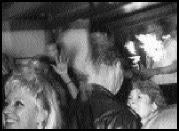What the hell happened on election night? Divining voters’ intent has never been easy. Especially given the variety of conflicting interests that produced a vote against a statewide gas tax, in favor of a city-only monorail tax, and for cheaper license-plate renewals in four Washington counties. As Tim Eyman would have it, the vote signified “enormous bitterness, anger, and frustration” on the part of statewide taxpayers fed up with skyrocketing taxes. But there are other, more plausible explanations. (For another view, see what my colleague, Geov Parrish, has to say on p. 19.)
One theory holds that voters simply don’t trust government. They voted down roads-heavy Referendum 51 and, at last count, favored the People’s Monorail. And they said yes to Eyman’s anti- establishment Initiative 776, which was nothing if not a big middle finger in the face of elected officials who think government has any direct role in improving people’s lives. The election put the monorail on the populist hot seat and confirmed Eyman’s position as the most powerful man in Washington politics. “Monorail is definitely an expression of a populist will,” says Seattle City Council member Nick Licata. “That’s true with Eyman as well. I don’t think a tax revolt is the core of people’s concerns so much as government accountability.” Monorail campaign spokesperson Peter Sherwin adds that the monorail was “the only transportation measure that even came close to 50 percent in a positive direction. It was the people’s election.”
So maybe it’s true, as Eyman says, that politicians have lost the public’s trust. But what about in Seattle, where voters clearly crushed I-776 and might have even passed R-51? (Votes have not yet been broken down by city.) It might be that, by supporting higher taxes, Seattle voters are simply throwing another layer on the wall we’re building around the city, election by election. State voters want to kill light rail and let the Alaskan Way Viaduct crumble? Fine. We’ll come up with a plan they can’t touch.
So what about light rail? Eyman holds that the vote against R-51, support for the monorail, and vote for I-776 constitute an “unambiguous message” to Sound Transit from across the state. But here in King County—and, as King County Council (and Sound Transit board) member Dwight Pelz points out, within Sound Transit’s own boundaries—the message wasn’t so transparent. King County voters rejected the anti-tax measure by a margin, at press time, of 59 percent to 41 percent. (Seattle’s margin will likely be even more skewed.) And the monorail, which was winning by fewer than 600 votes at press time, was hardly handed the mandate its supporters were hoping for. Sound Transit won its 1996 vote with a margin of 69 percent in Seattle.
“If we had to vote on light rail right now, I’d be very nervous,” Pelz says. “In three years, after people have started screaming about the [monorail] alignment and it has the same bureaucratic snafus [as light rail], monorail will be at 35 or 40 percent [support], and I just want Nick Licata to call for an election then.” Let’s hope, if anything is ever going to get built in this city, he doesn’t have to.
Erica Barnett







